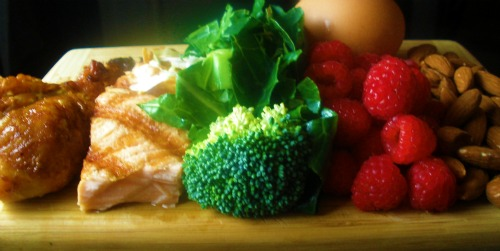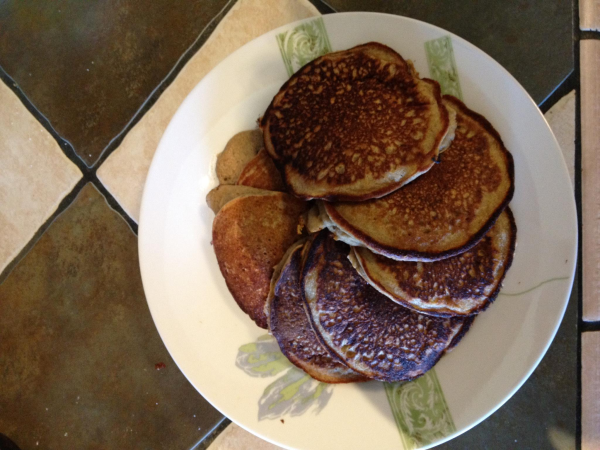When I first started studying health and nutrition I was amazed to learn about all the foods that are not healthy for me to eat. I remember being utterly confused when my professor explained that most, if not all, cereals are not good for you. I learned about all of the chemicals in processed foods; the poisons in our drinking water; the pesticides on our fruit; the nitrates on our meats. I was kind of shocked! And I wasn't a big junk food eater. I ate fairly healthy. Nonetheless, I saw the list of foods I shouldn't be eating growing longer and longer!
But holistic nutrition isn't about what you shouldn't be eating. It's about what you can and should be eating abundantly! That list was rather large. It just took some getting used to for this Latin American kid that grew up in the states. In fact I realized how much of the good foods I already enjoyed and ate on a fairly regular basis.
So rather than pointing out all the things I wish people wouldn't eat, let's take some time to discuss what foods are good for you without question. Now there are some foods that are healthy for most people, but not good for others. But I won't go into that today. Let's just talk about all of the foods that are considered whole foods. In an earlier
blog post I explained how a healthy diet is one that is based on whole foods.
Now what does that mean, whole foods? Well, a whole food is a food that can be eaten as-is without much processing. A whole food is something that hasn't been put through a machine before you eat it. A whole food is something that you can pretty much walk outside and find it growing (or grazing) somewhere on this earth.
Fruits are the most obvious. Almost every fruit or vegetable you can imagine can be included as a part of a healthy diet. There are so many I could never list them all here. But some of the best include berries, citrus, grapes; tropical fruits like papaya, pineapple and mango. Did you know watermelon is very high in Vitamin C? Fruit is best eaten whole, as opposed to juiced. This retains the important fiber naturally found in the fruit. Colorful fruits are full of vitamins and micro-nutrients like bioflavanoids which are believed to help prevent cancer and other ailments. Many of the nutrients in fruit are heat sensitive and best eaten raw. You should eat at least two servings of whole fruits per day. Are you eating your fruit quota? And, NO, a watermelon margarita does not count.
The vegetable "kingdom" is just as bountiful and perhaps even more diverse. There exists all of the vegetables the live above the ground like all of the greens, legumes (beans), squash and peppers; each with countless varieties. Included here are all of the root vegetables like potatoes, beets, parsnips and radishes. Cruciferous vegetables include broccoli (the champion against breast cancer), cabbage, kale and cauliflower. The dark greens are so beneficial for you because they are full of minerals like potassium, iron and calcium. Kale is an amazing green and everyone should learn to incorporate this into their diet. We should all be eating at least 5 - 7 servings of vegetables a day, if not more. Sorry, a can of V-8 doesn't cut it in my opinion.
If you don't have an allergy to grains like I do, the next whole food I would put towards the top of the list are whole grains like brown rice, wheat, barley, rye, spelt, kamut. Minimally processed grains are full of protein, Vitamin B and other nutrients our bodies crave for. Breads made from minimally processed (whole) grains can be healthy if made properly. Sourdough is a fermented grain bread and one of the best for you. Many grains need to be carefully prepared to ensure that they are easily digested. Most cultures have some form of preparing the grain that involves soaking or fermenting. This was done to make the grain more digestible. Soaking oats overnight makes them healthier and easier on the stomach. Unfortunately, most manufactured grain products are not processed this way.
Lately you hear a lot about people who have gone vegan, eating no animal products whatsoever. I don't want to contradict anyone's personal philosophy about this, but as a nutritionist I will attest that not everyone can eat this way and stay healthy for very long. Some people can eat this way and stay healthy, but many do not. And most would not choose this lifestyle. If you do not ascribe to veganism then you should include healthy meats from healthy animals.
We are conditioned in America to think primarily of beef, pork, chicken and sometimes fish when we think of eating meat. But there are others that are just as edible and often more nutritious, like buffalo, goat, ostrich and duck. The important thing to remember with meats is the quality of those meats. Animals, like humans, store their toxins in the fat and organs. Animals that have been fed chemically laden foods, injected with hormones and have been raised under poor conditions carry this bad energy and the toxic chemicals to your body if you consume them. In fact it is believed that eating meat from animals that are not raised in their most natural conditions (grass fed, pasture raised, free range, wild caught) is several times worse than eating fruits and vegetables that are not organically raised. So eat the best meat you can afford in moderate amounts that is least processed. Lunch meats are generally highly processed and contain nitrates (a known cancer causing chemical) to preserve them.
What I want to impress upon you learners is that the foundation to a healthy body starts with the building blocks I've just discussed. There are other healthy foods we will explore in subsequent weeks, especially fats, oils and nuts (see post
The Skinny on Fat). But these mentioned here should comprise the bulk of your meals. This is the fuel your body was designed to run on. It can be compared to a car. You can pour milk into a car's gas tank all you want. I'm no mechanic but I can tell you that it's not going to run on milk! Likewise, your body needs fruit, vegetables, grains and meats from healthy sources, the cleaner (organic) the better. But if you keep pouring processed junk foods and refined sugar into your tank your engine will eventually break down. Trust me.
Take a look at your next meal and ask yourself, "Is this a whole foods meal? What can I add to make it healthier? What can I eliminate or take less of?" Eat whole foods abundantly!
NOTE: On my
Facebook Fan Page I will often post photos of healthy meals that I've made or someone else has made to show that healthy foods can be appetizing and creative. Feel free to post your photos there as well.


